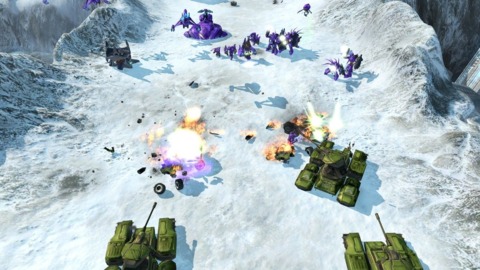Halo Wars dev on disassembling Ensemble
D.I.C.E. 2009: The Age of Empires may be over, but Ensemble Studios cofounder Bruce Shelley recaps what his studio did right--and what it did wrong--during its 14-year run.
LAS VEGAS--It's not uncommon for game conferences to play host to game postmortems; that is, frank discussions from developers about what worked and what didn't with their latest efforts. This week's D.I.C.E. Summit played host to a postmortem of a different kind, as Bruce Shelley, cofounder of Microsoft's shuttered Ensemble Studios, reflected on what led the Halo Wars studio to its demise.

Accentuating the positive, Shelley started with what the company did right. From the very beginning, Shelley stressed, the studio's priorities were to create a great place to work and to make great games, in that order. The company culture came up time and again as an example of what Ensemble did right, especially in the early years. Shelley brought up the strong sense of community the team had, a recruiting process that involved the entire team, a focus on boosting morale, and strong communication within the studio.
Additionally, Shelley said the company showed some wisdom in its choice of games. When the company started in 1995, the real-time strategy genre was exploding, but everybody was making sci-fi or fantasy RTS games. That made Ensemble's historical Age of Empires, released in 1997, stand out from the crowd and gave the company a competitive edge.
Other Ensemble successes that Shelley touted included delivering exceptional value for the price in each game, building games with an appeal that spanned regions and gaming tendencies, and keeping a low turnover rate among its employees. When Ensemble closed down, Shelley noted that 60 percent of the employees had been with the company since the original Age of Empires project--or at least 12 years.
When it came time to assess what went wrong, Shelley brought up many of the same points again, noting that those qualities eroded in later years. As the studio grew, the culture changed, and the sense of community was negatively impacted. Shelley said it was harder to find quality hires to fill every lead position, especially once the studio split into three teams.
The lack of genre diversification was also a problem, as it tied the company's fate to the popularity of the RTS genre. While Ensemble did try to branch out multiple times over the years, those projects wound up canceled. Shelley also said the studio tried to do too much with each game, which led to the near constant cutting of features, long crunch times, and delays.
Finally, Shelley said the last thing Ensemble did wrong was to be closed down. The management thought it had been running the company from a strategically sound point of view, but in hindsight there may have been ways to stave off the closure. Shelley suspects that the Texas studio's ties to Washington-based parent company Microsoft had become too weak over the years due in part to distance. Ensemble also may have erred in not downsizing at all after Microsoft canceled two of the studio's projects. Not only that, but the company continued to go full speed ahead with plans to expand even further with new facilities.
"It's a sad day, but this is business," Shelley said. "Maybe we didn't do some things very well. We were shocked, but we've gone through the stages of grief and now we're looking for a new direction."
Sad as the closure might be for Shelley, he was heartened that there are already two studios starting up out of the ashes of Ensemble. In addition to the already announced Robot Entertainment, ex-Ensemble players have stoked a new operation called Bonfire Studios.
Got a news tip or want to contact us directly? Email news@gamespot.com


Join the conversation